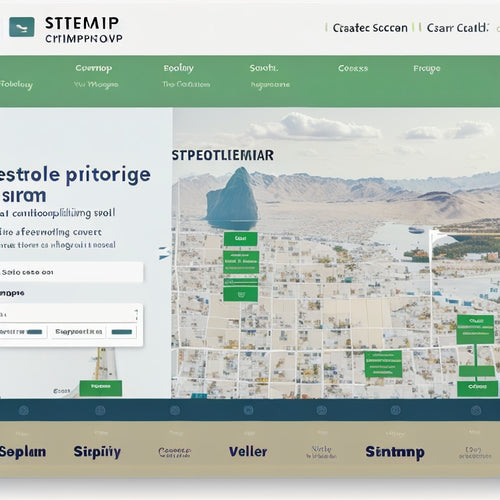
Create Online Courses to Grow Your Merchant Business
Share
To grow your merchant business, create online courses that showcase your expertise and provide value to your customers. First, identify profitable course topics by researching industry trends and understanding your target audience's pain points. Define your ideal student, structure engaging content, and choose a platform that fits your needs. Craft a compelling course title and develop a marketing strategy, including email marketing and content creation. Finally, measure course success by tracking completion rates, revenue growth, and student feedback. By following these steps, you'll be well on your way to establishing your business as an authority in your industry - and there's more to explore from here.
Key Takeaways
• Identify profitable course topics by researching industry trends, pain points, and niche markets to create relevant content for your merchant audience.
• Define your target student by understanding demographics, learning objectives, and preferred learning styles to create a tailored learning experience.
• Structure engaging course content by breaking down modules, including interactive activities, and using clear language to increase student engagement and retention.
• Choose the right platform for your online course by assessing user experience, analytics, and scalability to ensure a seamless learning experience.
• Develop a marketing strategy that showcases your expertise, leverages email marketing, and utilizes key performance indicators to measure course success and drive growth.
Identifying Profitable Course Topics
To create a profitable online course for merchant businesses, you need to pinpoint topics that resonate with your target audience and address their most pressing pain points. This requires researching trends in the industry and identifying niche markets that are ripe for disruption.
Start by analyzing online communities, forums, and social media groups where merchant business owners congregate. What're their biggest challenges? What questions do they ask repeatedly? Take note of the topics that generate the most engagement and debate.
You can also use tools like Google Trends and Keyword Planner to identify popular search terms and topics related to merchant businesses. By doing so, you'll uncover hidden opportunities to create a course that addresses a specific need or solves a particular problem.
For instance, you might find that many merchant business owners struggle with optimizing their payment processing systems or managing inventory levels. By creating a course that tackles these issues head-on, you'll be well on your way to creating a profitable online course that resonates with your target audience.
Defining Your Target Student
As you explore creating a profitable online course for merchant businesses, it's important to pinpoint the ideal student who'll benefit most from your instruction. Defining your target student is essential to creating a course that resonates with them and addresses their specific needs.
To get started, consider the following key factors to help you define your target student:
-
Understanding demographics: Identify the age, gender, occupation, and income level of your ideal student. Are they experienced entrepreneurs or new to the merchant business industry?
-
Market research: Analyze your competition, industry trends, and online forums to understand the pain points and challenges your target student faces.
-
Learning objectives: Determine what your target student wants to achieve from your course. Are they looking to improve sales, increase efficiency, or expand their product offerings?
- Preferred learning style: Consider how your target student learns best. Do they prefer video tutorials, interactive exercises, or written guides?
Structuring Engaging Course Content
Now that you've defined your target student, you're ready to create course content that resonates with them and addresses their specific needs. To do this, you'll want to structure your content in a way that's engaging, informative, and easy to follow.
Start by breaking down your course into modules or lessons that focus on specific topics or skills. Within each module, include a mix of interactive activities, such as quizzes, discussions, and hands-on exercises, to keep students engaged and motivated.
Visual aids like videos, images, and infographics can also help to illustrate complex concepts and make your content more dynamic. Be sure to use clear, concise language and avoid jargon or technical terms that might confuse your students.
Choosing the Right Platform
When selecting a platform for your online course, you'll need to weigh several key factors that can make or break your success.
You'll want to evaluate the features that matter most to your business, ensuring they align with your goals and objectives.
Platform Features Matter
You'll want to carefully assess the features of various platforms before committing to one, as the right set of tools can make all the difference in the success of your online course for merchant businesses. The platform you choose should provide a seamless user experience, allowing you to customize the layout, branding, and content to fit your merchant business's unique needs.
Here are four key features to examine:
-
User experience and customization:
Can you easily tailor the course to your brand's identity?
Does the platform offer a range of templates and design options? -
Analytics and data tracking:
Does the platform provide robust analytics to help you track student progress, engagement, and performance? -
Content creation and upload:
How easy is it to create and upload course content, such as videos, images, and text-based materials?
-
Integrations and scalability:
Can the platform integrate with other tools and systems you're already using, and does it have the capacity to grow with your business?
Cost and Scalability
As you weigh the pros and cons of different platforms, consider how the cost and scalability of each option will impact your online course's long-term viability and profitability. You'll want to choose a platform that aligns with your pricing strategies and offers scalability options that can adapt to your growing needs.
When budgeting for growth, consider the total cost of ownership, including any upfront fees, subscription costs, and potential add-ons. You'll also want to assess the platform's scalability options, such as the ability to handle increased traffic, course expansion, and user growth. Look for platforms that offer flexible pricing plans, so you can scale up or down as needed.
To guarantee long-term profitability, consider the potential return on investment (ROI) for each platform. Will the costs of the platform outweigh the revenue generated by your online course?
Integration and Support
Selecting a platform that seamlessly integrates with your existing tools and systems, and provides reliable support, is essential to the success of your online course. You want to make certain that your chosen platform can easily connect with your website, CRM, and other tech solutions, streamlining your workflow and minimizing technical issues.
When evaluating platforms, consider the following key factors:
-
API and integration capabilities: Can the platform integrate with your existing tools, and does it offer API access for custom integrations?
-
Customer service: What kind of support does the platform offer, and how responsive are they to your needs?
-
Uptime and reliability: Does the platform have a strong track record of uptime and reliability, ensuring your course is always accessible?
- Customization options: Can you personalize the platform to fit your brand and needs, or are you limited to a generic template?
Marketing Your Online Course
Now that you've created your online course, it's time to get the word out.
You'll need to showcase your course in a way that resonates with potential students, and that starts with crafting a compelling title that grabs their attention.
Craft Compelling Course Titles
Crafting a Compelling Course Title
To stand out in a crowded market and attract the right students to your course, it's essential to create a title that grabs attention by pinpointing specific pain points or goals of your target audience. By focusing on benefits, using action verbs, making it specific, and keeping it concise, you can craft a compelling title that resonates with potential students.
Focus on benefits: Instead of listing features, explain how your course will benefit your students. For example, 'Increase Your Online Sales by 20% with Our Proven Strategies.'
Use action verbs: Verbs like 'Mastering,' 'Boosting,' and 'Optimizing' create a sense of action and urgency.
Make it specific: Avoid generic titles that could apply to anyone. Instead, target a specific audience or industry, like 'Merchant Businesses' or 'E-commerce Entrepreneurs.'
Keep it concise: Your title should be short, sweet, and to the point. Aim for 5-7 words that pack a punch.
Leverage Social Media Channels
To effectively market your online course, regularly utilize social media platforms to build a community, share valuable content, and drive traffic to your course landing page.
You can create engaging content that resonates with your target audience, such as infographics, videos, or blog posts, to showcase your expertise and provide value. Share behind-the-scenes insights, sneak peeks, or exclusive tips to pique their interest and encourage audience engagement.
Focus on platforms where your target audience is most active, such as Facebook, Instagram, Twitter, or LinkedIn. Share user-generated content, respond to comments, and use relevant hashtags to increase visibility. Collaborate with influencers or other industry experts to expand your reach and credibility.
Develop Email Marketing Strategy
As you've built a community and driven traffic to your course landing page through social media, you're likely accumulating a list of interested learners, making it an ideal time to develop an email marketing strategy that nurtures these leads and encourages them to enroll in your online course.
To create an effective email marketing strategy, consider the following:
-
Segment your list: Divide your email list into groups based on engagement, demographics, or behaviors to tailor your messaging and increase relevance.
-
Craft compelling subject lines: Use attention-grabbing subject lines that resonate with your audience, such as 'Unlock Exclusive Course Content' or 'Get Ready to Boost Your Sales'.
-
Leverage automation tools: Utilize automation tools to streamline your email campaign workflow, saving you time and ensuring consistent communication with your leads.
- Personalize your content: Address your learners by name and create content that speaks directly to their pain points, increasing the likelihood of conversion.
Measuring Course Success Metrics
You'll need to track specific metrics to determine whether your online course is achieving its intended goals for your merchant business. This involves tracking retention rates, analyzing feedback data, and monitoring other key performance indicators (KPIs) to gauge the success of your course.
Here are some essential metrics to track:
| Metric | Description |
|---|---|
| Completion Rate | Percentage of students completing the course |
| Average Rating | Overall rating of the course from student feedback |
| Revenue Growth | Increase in revenue generated from course sales |
Frequently Asked Questions
Can I Create a Course if I'm Not an Expert in the Subject?
You can create a course even if you're not an expert, by outsourcing to experts or collaborating with them. Research and learning will be part of your journey, but it's a worthwhile investment for creating a high-quality course.
How Do I Protect My Course Content From Being Stolen?
You'll protect your course content from being stolen by watermarking your videos, registering your intellectual property rights, and using secure platforms with access controls, ensuring only authorized users can access your valuable material.
Do I Need to Offer Refunds or Guarantees to Students?
You'll build trust with students by establishing clear refund policies, ensuring they know what to expect from your course. By managing course expectations, you'll boost student satisfaction and reduce refund requests, ultimately protecting your reputation.
Can I Use Copyrighted Materials in My Online Course?
When using copyrighted materials, you'll need to think about fair use or public domain exceptions. For instance, a course on 1920s literature can freely use public domain works like F. Scott Fitzgerald's early short stories.
How Do I Handle Differing Time Zones for Live Sessions?
You'll need to master time management strategies for live sessions across different time zones. Utilize virtual classroom tools that offer scheduling solutions to guarantee global audience engagement, and consider recording sessions for on-demand access.
Related Posts
-
Can Video Shopping Ads Be Used Effectively in Industries Outside of Fashion and Beauty?
Video shopping ads have become a popular marketing tool in the fashion and beauty industries, allowing consumers to ...
-

How Do I Create a Sitemap on Shopify
This article provides an informative overview of the process of creating a sitemap on the Shopify platform. The disc...
-

What Is the Best Instagram Feed App for Shopify
This article aims to provide an objective analysis of the best Instagram feed app for Shopify. By adhering to an aca...

